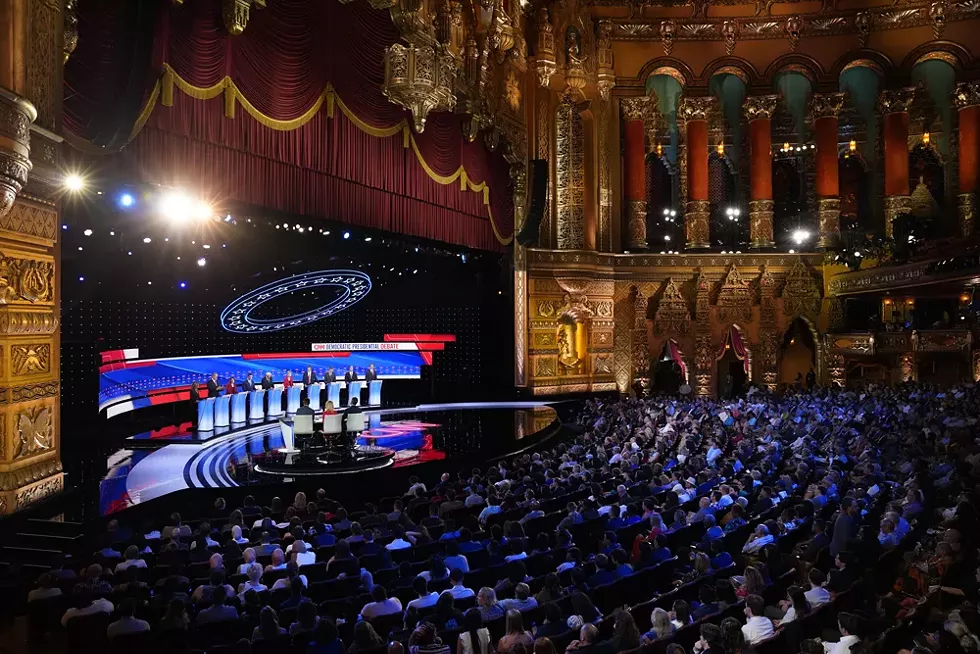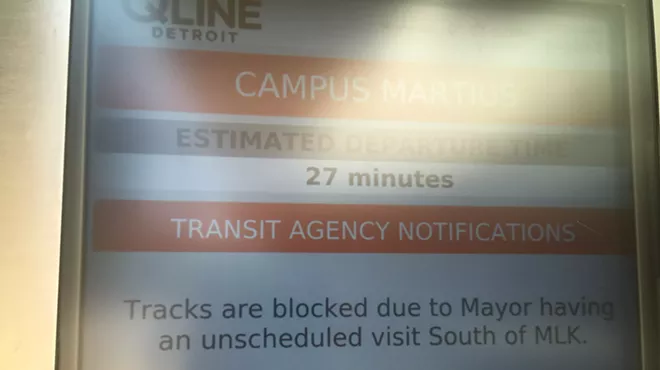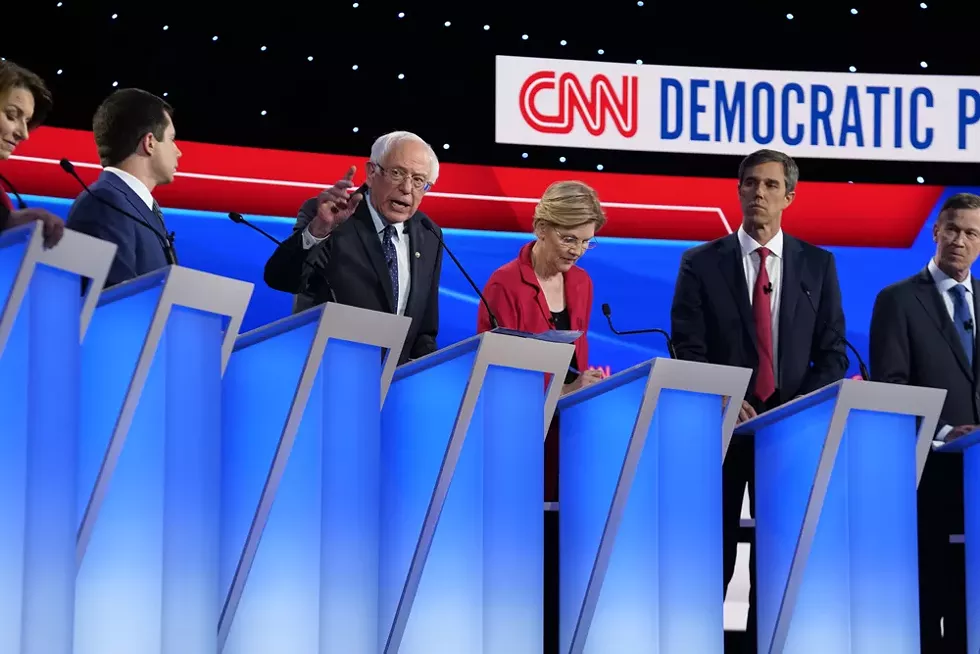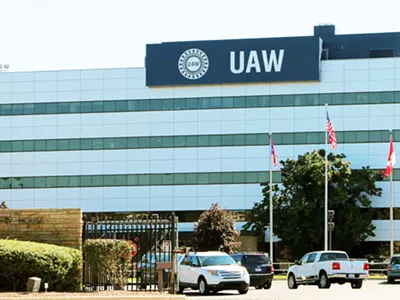During a media orientation ahead of last week's Democratic presidential debates, a representative from CNN, the event's broadcast partner, explained that the arrival of the debate stage in Detroit's historic Fox Theatre came from a bit of corporate synergy.
The Democratic National Committee, the CNN suit explained, had long planned on doing one of its 12 debates in Michigan. That was a no-brainer: in the endless relitigation of the 2016 election, in which Donald Trump narrowly defeated Hillary Clinton by fewer than 11,000 votes, the party was accused of taking Rust Belt states like Michigan for granted.
"The road to the White House in 2020 runs through Michigan," CNN wrote in one of the color-by-numbers, parachute journalism-style digital articles it published ahead of the two nights of debates to help set the stage.
The CNN rep said the network worked with the DNC to find a suitable venue, and the 5,000-seat Fox Theatre was ultimately chosen for its telegenic beauty and its availability. Producing an event like this second round of Democratic 2020 debates — the first round was held in June in Miami, and 10 more are planned before November 2020 — is apparently a mammoth undertaking. At the orientation, which mostly functioned to give photographers and videographers a chance to calibrate their equipment to the theater's lighting, another CNN rep boasted that transforming the Fox into a debate stage took a crew of more than 100 people laboring over eight days. The venue was outfitted with more than 500 additional lights, several thousand feet of cables, and more than 25 cameras across the event's entire footprint, which included the theater, the next-door Hockeytown Cafe (which served as the media "spin room"), and an anchor set for pundits located across the street in front of Comerica Park, delivered in nine 53-foot semi trucks.
In many ways, Detroit's theater and sports district was the perfect venue for CNN's debate.
That's because despite Trump's repeated jab at CNN as "fake news," the outlet has arguably done more to deliver us the real estate tycoon-turned-reality TV star president than even the far-right Fox News or Breitbart. It was Jeff Zucker, President of CNN Worldwide, who greenlighted The Apprentice when he was at the helm of NBC Entertainment in 2004.
"That show, more than anything, reversed Trump's fortunes, recasting a local tabloid villain as the people's prime-time billionaire," New York Times Magazine reported in a 2017 profile of Zucker. ("CNN Had a Problem. Donald Trump Solved It.") "And it was Zucker who, as president of CNN, broadcast the procession of made-for-TV events — the always news-making interviews; the rallies; debates; the 'major policy addresses' that never really were — that helped turn Trump into the Republican front-runner at a time when few others took his candidacy seriously." According to NYT Magazine, "CNN was the first major news organization to give Trump's campaign prolonged and sustained attention."
Following the success of The Apprentice, Trump reportedly returned the favor, lobbying for CNN to hire Zucker in 2012 after he was fired from NBC following Comcast's purchase of NBC Universal. And by the time Trump announced his presidential campaign in 2015, the network was all in. For a while, Trump was happy to appear on the network, and the network was happy to give Trump countless hours of airtime — even if it just meant broadcasting an empty podium at a Trump rally to build suspense. Another Zuckerism birthed during the 2016 political campaign was the idea to treat it like a giant sporting event. A sports fan, Zucker reportedly looked to ESPN for ideas on how to cover the 2016 campaign: that meant flashy 3-D graphics, countdown timers, and chattering talking heads to analyze the campaigns' play-by-plays, all feeding into CNN's never-ending 24-hour news cycle.
The Trump-Zucker bromance didn't last, however. Though CNN has denied it hired Zucker because of Trump, Trump reportedly sent Zucker an email after the network criticized his performance during the presidential debates in October 2016. "Jeff — Too bad you (CNN) couldn't be honest with how well I did in the debate," Trump reportedly wrote. "The dumbest thing I ever did was get you the job at CNN — you are the most disloyal person. Just remember, I always seem to find a way to get even. Best wishes, Donald J. Trump." Last year, Trump briefly revoked the press credentials of CNN correspondent Jim Acosta after he asked tough questions about Trump's racism during a particularly long press conference, calling him an "enemy of the people"; a federal judge later ordered the White House to restore it.
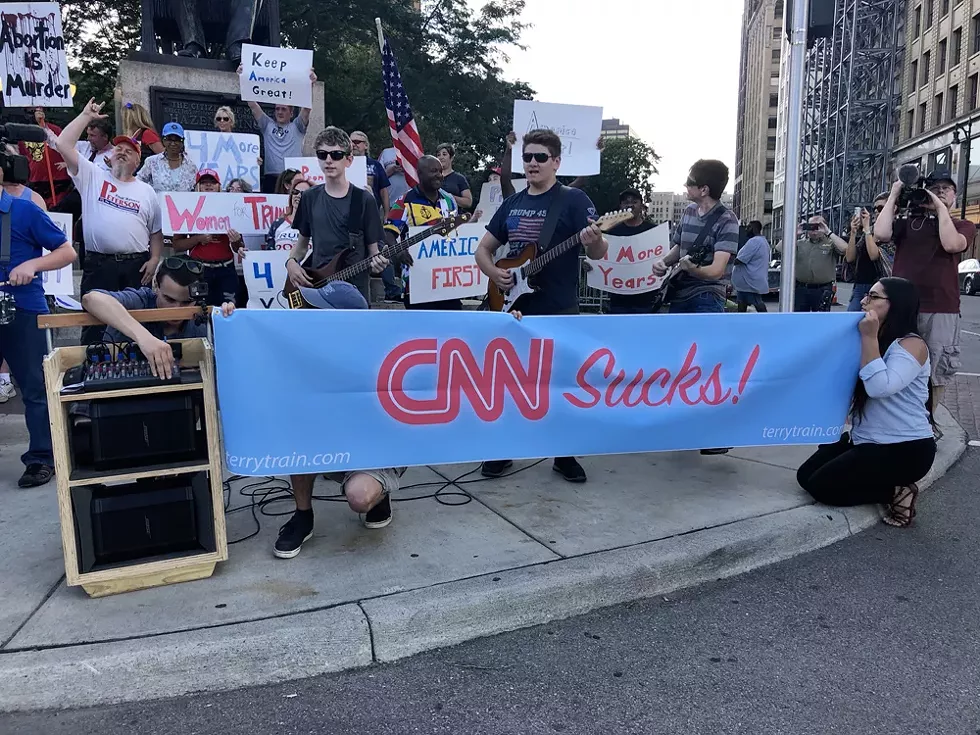
In the end, Trump was a boon to CNN. According to NYT Magazine, the company reported its average daytime audience had increased more than 50 percent, and its prime-time audience 70 percent. Reporting earnings of $1 billion, it was CNN's most profitable year in its history.
"It's hard to imagine that either Trump or Zucker would be where he is today without the other," NYT Magazine's Jonathan Mahler wrote. "It's a symbiotic relationship that could only thrive in the world of television, where the borders between news and entertainment, and even fantasy and reality, have grown increasingly murky."
Flash forward to last week's Detroit debates, and it's clear the network has doubled down on its politics-as-sports coverage. As the debate started, the media — hundreds of journalists from outlets from across the world — were herded into Hockeytown Cafe's "spin room" to watch the debate on big-screen TVs. A dramatic, sportscast-style voiceover promised "a fight for the heart of the Democratic party," with a "match-up between Massachusetts Sen. Elizabeth Warren and Vermont Sen. Bernie Sanders, the two top progressives in the Democratic primary" on Tuesday and a "rematch of former Vice President Joe Biden and California Sen. Kamala Harris" on Wednesday. A crowded onscreen graphic showing all of the candidates looked more like the character select screen for the Super Smash Bros. video game.
In a pregame warmup act, DNC Chair Tom Perez whipped himself and the crowd into a frenzy from the Fox Theatre stage. It was a bit of breath of fresh air compared to the 2016 campaign, when the Democratic Party seemed certain of its impending victory. (Perez replaced former DNC chair Debbie Wasserman Schultz, who resigned after WikiLeaks released emails obtained by alleged Russian hackers that suggested the DNC had not in fact been neutral, as is its policy, in the 2016 primary by supporting Clinton's campaign and deriding Sanders'.)
At times recalling the "scream heard around the world" of Democratic candidate Howard Dean's doomed 2004 campaign, Perez got so excited he mixed metaphors — in one breath, saying "our democracy is on fire and it's a five-alarm blaze," and in another comparing the next two nights of debates as akin to "speed dating."
"CNN, I want to thank them for making this debate a remarkable success," he said, his voice hoarse. "They're going to put on a professional show."
Given the WWE-style packaging of the event, we almost expected Massachusetts Sen. Elizabeth Warren to walk out on stage and slam Vermont Sen. Bernie Sanders over the head with a metal folding chair. Fortunately for America, Sanders and Warren refused to maintain CNN's kayfabe, emerging as the stars of night No. 1 in the process.
Given the WWE-style packaging of the event, we almost expected Elizabeth Warren to walk out on stage and slam Bernie Sanders over the head with a metal folding chair.
tweet this
That doesn't mean things didn't get ugly. True to form for CNN, the first night of the debate unfolded more like a game show. Per the network's rules, candidates had 60 seconds to respond to a question from a moderator, and 30 seconds for responses and rebuttals when attacked by name. But as critics swiftly pointed out on Twitter and in analyses published in the following days, event moderators Jake Tapper, Dana Bash, and Don Lemon seemed more interested in pitting candidates against each other — and breaking their own time-limit rules — for dramatic effect.
Critics also noted that the framing of many of the questions seemed odd — framing Democratic party values in the worst possible light, like "Would you give health insurance to undocumented immigrants?" and "Should the U.S. tie its own hands by having a policy not to use a nuclear weapon unless another country uses one first?" (At orientation, we asked CNN if the audience would be able to ask the candidates questions. The CNN rep said they would not; the questions came from CNN viewers, they said, but did not further elaborate on their methodology.)
One of the early questions in the debate touched on whether the middle class should pay more in taxes in order to support universal health care, or "Medicare for all."
"As people talk about having insurance, there are millions of people who have insurance — they can't go to the doctor, and when they come out of the hospital, they go bankrupt. All right?" Sanders said. "What I am talking about and others up here are talking about is no deductibles and no co-payments. And, Jake, your question is a Republican talking point."
"And by the way — and by the way — by the way — the health care industry will be advertising tonight on this program," Sanders added. When Tapper tried to pivot to another question, Sanders asked for more time to complete his thought.
"They will be advertising tonight with that talking point," he said.
Indeed, as The American Prospect's David Dayen noted in a post-debate analysis, anti-single payer health care ads paid for by Big Pharma did in fact air during the commercial break.
In the end, 60-second bursts of time proved to be a terrible way to discuss complex issues like health care. It was, however, the perfect amount of time to produce soundbites and viral tweets.
One of those moments on night No. 1 came from Marianne Williamson, who was generously described by CNN as a "Washington outsider" and "author" but is better known among metro Detroiters as the head of the former Church of Today, a new age-y megachurch in Warren.
"I assure you, I lived in Grosse Pointe," she said. "What happened in Flint would not have happened in Grosse Pointe. This is part of the dark underbelly of American society. The racism, the bigotry, and the entire conversation that we're having here tonight — if you think any of this wonkiness is going to deal with this dark psychic force of the collectivized hatred that this president is bringing up in this country, then I'm afraid that the Democrats are going to see some very dark days."
At another point, Tapper attempted to pit Warren against Sanders, asking her if her point to self-identify as a capitalist was her way of convincing voters that she was safer choice than Sanders, a vocal supporter of socialism.
Warren didn't take the bait. "No. It is my way of talking about I know how to fight and I know how to win," she said. "I took on giant banks, and I beat them. I took on Wall Street, and CEOs, and their lobbyists, and their lawyers, and I beat them. I took on a popular Republican incumbent senator, and I beat him."
"I get it. There is a lot at stake, and people are scared," she said. "But we can't choose a candidate we don't believe in just because we're too scared to do anything else. And we can't ask other people to vote for a candidate we don't believe in."
After failing to get Sanders and Warren to fight, Tapper must have figured maybe he could get one of the more desperate candidates to do so, turning to John Delaney, a former Maryland representative who is polling at less than 1 percent, for a rebuttal.
"So — so I think Democrats win when we run on real solutions, not impossible promises, when we run on things that are workable, not fairy tale economics," Delaney replied. "Look at the story of Detroit, this amazing city that we're in. This city is turning around because the government and the private sector are working well together. That has to be our model going forward. We need to encourage collaboration between the government, the private sector, and the nonprofit sector, and focus on those kitchen table, pocketbook issues that matter to hard-working Americans: building infrastructure, creating jobs, improving their pay..."
Of course, plenty in Detroit would argue that while the public-private partnership has done wonders for downtown Detroit, it has yet to trickle down to the rest of the city's neighborhoods. At this point, Warren, exasperated, created one of the other viral moments of the night.
"You know, I don't understand why anybody goes to all the trouble of running for president of the United States just to talk about what we really can't do and shouldn't fight for," she said.
The inadequacies of CNN's format continued into night No. 2. At one point early in the debate, a group of protesters started heckling from the audience; watching from TV, it was difficult to tell what they were saying. But thanks to audience members taking to Twitter with their smartphones, it was revealed the protesters were saying "fire Pantaleo," a reference to Daniel Pantaleo, the NYPD officer who choked Eric Garner to death, directed at candidate and New York Mayor Bill de Blasio.
It's interesting to note that CNN, with its penchant for drama and its more than 25 cameras, chose not to turn a single one of them around to aim it at the protesters. Instead, it kept them aimed steadfastly at the stage while the hecklers were escorted out of the theater.
Protest is Democratic. #firepantaleo #DemDebate #DemDebate2 pic.twitter.com/CcRd2vpSsz
— Diana Hussein (@heyadiana) August 1, 2019
On that note: Night No. 2's crop of debaters continued to latch onto the "that's a Republican talking point" talking point. California Sen. Kamala Harris dodged Colorado Sen. Michael Bennet's critique of her plan to eliminate employer-based health insurance by saying "we cannot keep with the Republican talking points on this." At another point, moderator Lemon framed former Secretary of Housing and Urban Development Julián Castro's immigration policy as welcoming "open borders."
"Open borders is a right-wing talking point, and frankly I'm disappointed that some folks, including some folks on this stage, have taken the bait," Castro responded.
At a certain point, the Democratic candidate's dodges began to feel a bit unfair. As the conservative National Review opined in a post-debate analysis, "'Republican talking points' is to Democrats as 'fake news' is to Donald Trump."
As the night wore on, it was apparent that CNN's debate format failed to flesh out complex issues like health care reform in any meaningful or engaging way. But again, it was a good enough format to produce another viral zinger. This time it came from Andrew Yang, a businessman (who describes himself as "the opposite of Donald Trump, an Asian man who likes math") concerned about the rise of automation and whose sole campaign promise is a $1,000-per-month "Freedom Dividend" for all American citizens.
"Instead of [talking about] automation in the future, including the fact we automated away 4 million manufacturing jobs ... we're up here with makeup on our faces and our rehearsed attack lines, playing roles in this reality TV show," he said. "It's one reason why we elected a reality TV star as our president."
So many of the post-debate analyses reduced the two nights to critiques of performance, and it's hard not to do that here, especially when policies are reduced to 60-second soundbites. Through CNN's format, a matter like health care reform — literally a matter of life and death for millions of Americans — is rendered not only incomprehensible, but also incredibly boring. As Salon summarized, "With any luck, two nights of 10-way televised debates will be one of those singular oddities we'll all look back on some day and agree was a terrible idea."
CNN produced a sea of content, but hardly any of it was usable. Tuesday night's event ran a full two hours and 43 minutes, while Wednesday's was even longer, at two hours and 47 minutes. "That's only slightly shorter than Avengers: Endgame, a crowded battle royale, but one which people voluntarily and enthusiastically paid money to see," Salon wrote.
Even Trump wanted more. Following the June debates, Trump tweeted one word: "BORING!" After the Detroit debates wrapped up, Trump continued his critique. "Very low ratings for the Democratic Debate last night — they're desperate for Trump!" he wrote.
Apparently, he was right. According to Nielsen Media Research, the first main-tier GOP debates aired on Fox News in August 2015 drew an average of 23.9 million people – an all-time debate viewership record. The second GOP primary debate, aired on CNN in September 2015, attracted 22.8 million viewers. Meanwhile, Tuesday's CNN debates drew 8.69 million viewers, while Wednesday's drew 10.72 million viewers. That's down from the two June debates, which drew 15.26 million and 18.1 million viewers respectively.
Through CNN’s format, a matter like health care reform — literally a matter of life and death for millions of Americans — is rendered not only incomprehensible, but also incredibly boring.
tweet this
Hopefully, as the playing field becomes more narrow, the issues can get more screentime. The DNC has raised its standard for the third round of debates: candidates must amass 130,000 unique donors and register at least 2 percent support in four polls by Aug. 28. So far, at least seven of the 20 have qualified: Biden, Harris, Sanders, and Warren, in addition to New Jersey Sen. Cory Booker; Mayor Pete Buttigieg of South Bend, Ind.; Minnesota Sen. Amy Klobuchar; and former Texas Rep. Beto O'Rourke. Castro, Yang, and Hawaii Rep. Tulsi Gabbard are reportedly within reach as well.
But as we brace for more "wonkiness," to use Williamson's parlance, it's important to remember: none of this is supposed to be entertaining.
In a lengthy feature story for Rolling Stone, David Foster Wallace spends some 15,000 words following John McCain's long-shot 2000 presidential campaign against George W. Bush. The tediousness of the long article reflects the tediousness of American politics, and that tediousness of politics, Wallace writes, is by design: a cynical effort by the powers that be to disenfranchise what he calls "Young Voters," or the Rolling Stone demographic. For a brief time, McCain's "anti-candidate candidacy" — his perceived "I don't-give-a-shit-if-you-elect-me honesty," which was the result of careful media spin — provided both a breath of fresh air to the political media, as well as a paradox: can "authenticity" and shrewd marketing co-exist?
But post-Trump, the pendulum has swung the other way. We now live in a media-saturated world of plentiful entertainment. (It's worth noting that Wallace's most famous work of fiction is about a form of entertainment so mesmerizing it causes death.) "Try to stay awake," Wallace implores at the end of the RS story. In an economy of limited attention spans, it's going to be difficult for "wonkiness" to compete against the rise of Trump's unique blend of ratings-fueled fascism. Remember that as the debates head into round No. 3 in September.
Stay on top of Detroit news and views. Sign up for our weekly issue newsletter delivered each Wednesday.


